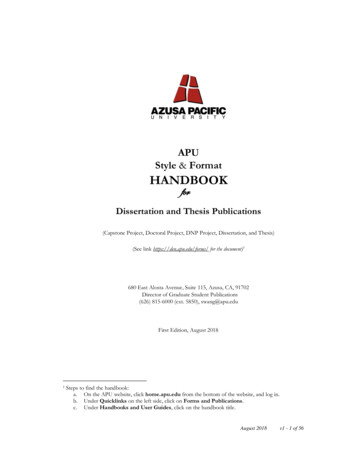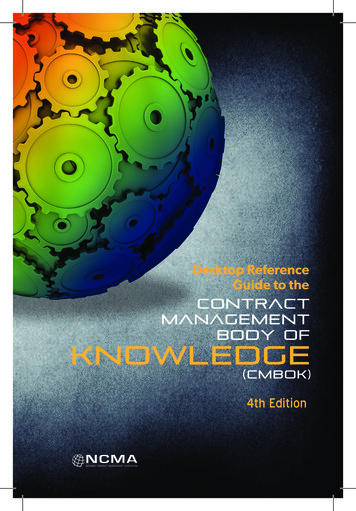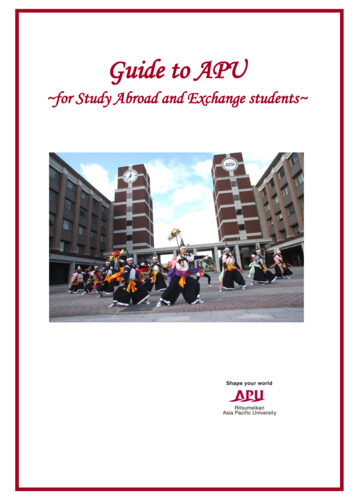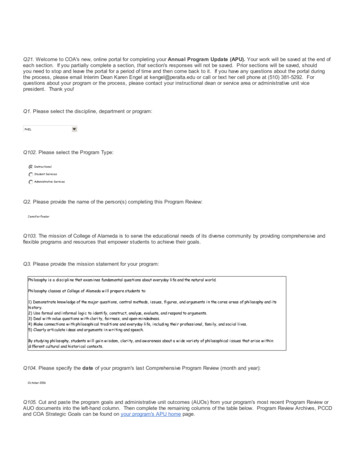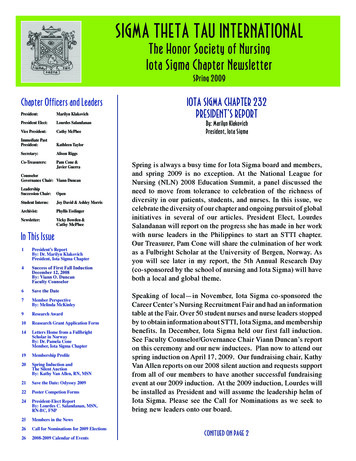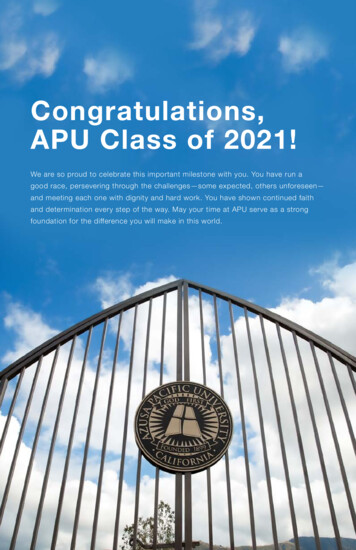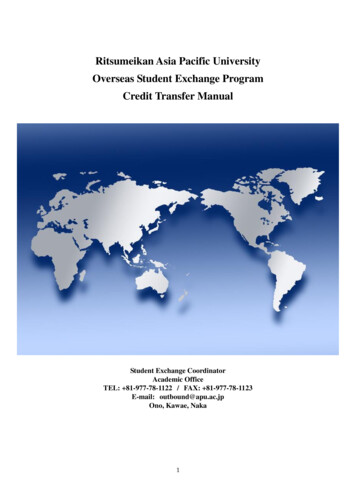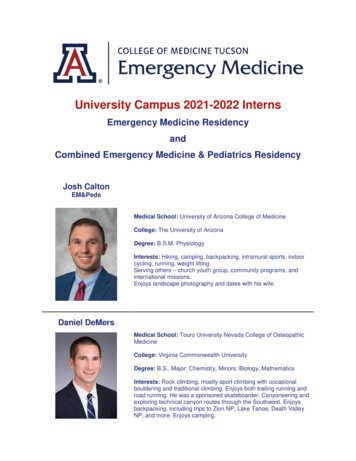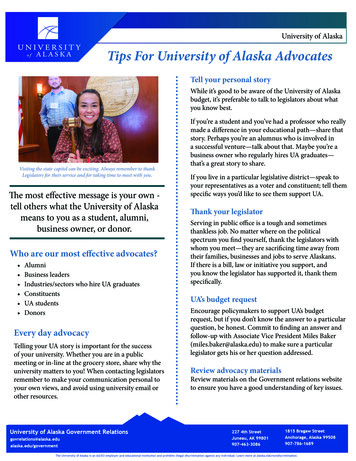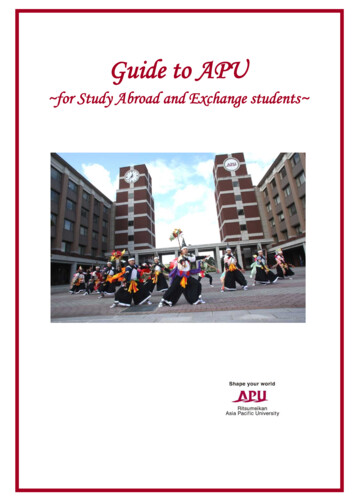
Transcription
Guide to APU for Study Abroad and Exchange students 1
Table of Contents:1.Message from APU32.Preparation for Departure and Arrival at APU43.Housing84.Studies at APU105.Life at APU and Beppu146.Medication and Health Insurance167.Culture Shock178.Warning: Criminal Behavior and Drugs189.Helpful Websites202
1. Message from APUこんにちは! Konnichiwa!Congratulations on your acceptance as a StudyAbroad/Exchange Student to Ritsumeikan AsiaPacific University (APU). While at APU, you willhave the opportunity to experience Japaneselanguage and culture while participating in thetruly multi-cultural environment which the APUcampus offers. In many ways, you represent youruniversity and your home country to the APUcommunity. It is our opportunity to learn from youat the same time that you are learning from us.We welcome you and hope that your time at APUwill be an enriching experience.Quick APU facts:・ Established in 2000・ Nearly 6,000 undergraduate andgraduate students・ 43% are international students from80 countries (See Student Enrollmentby Country/Region)Contact InformationRitsumeikan Asia Pacific University:AddressAcademic OfficeRitsumeikan Asia Pacific University1-1 Jumonjibaru, Beppu, Oita874-8577 JAPANEmailinbound@apu.ac.jpTELFrom overseas: 81-977-78-1101In Japan: 0977-78-1101FAXFrom overseas: 81-977-78-1102In Japan: 0977-78-11023
2. Preparation for Departure and Arrival at APU1. VISA ACQUISITION(1) Application of the Certificate of Eligibility for a Status of Residence (COE)Before visa application, successful applicants to APU must first obtain a COE from the Japanese ImmigrationBureau. APU will apply for the COE on behalf of successful applicants if the following requirements are met:a. Applicants have paid all the necessary fees by the stipulated deadline.b. Applicants are able to prove they possess sufficient finances for their period of studies and havesubmitted all the required documents.We usually receive the COE from Japanese Immigration office approx. 5 weeks after we apply for it.(2) Procedures after obtaining the COEAfter APU applies and receives the COE on the student's behalf, APU will send the COE to your home universitycoordinator/Study Abroad Agent with the original Acceptance Letter. After receiving those documents, you arerequired to apply the Student visa at the Japanese Embassy/Consulate General with the following documents:a. The Certificate of Eligibility for a Status of Residence (COE)b. Acceptance Letterc. Passportd. One Photograph(45mm square)e. Other documents: Documents may differ depending on the country/region you reside. Since some ofthese documents may take time to be prepared, please contact the Japanese Embassy/ConsulateGeneral for further information as early as possible.If you need the COE to be sent directly to you instead of your home university, please provide us with yourmailing address and telephone number by email. Make sure to copy your home university coordinator wheninforming us by email.1. 2. BOOK FLIGHTThe most convenient airports to get to APU from are Fukuoka Airport ( International Terminal / Domestic Terminal)or Oita Airport ( Domestic Terminal). Highway bus services are available from both airports.When booking your flight, please proceed only after confirming the date of entrance to AP House. Please makearrangements for travel insurance on your own. The National Health Insurance coverage begins from the day youcheck into AP house. .You will only be able to check into the accommodation during the arrival days. Please refer to the invoice for thelatest check-out date. You can also check Academic Calendar for the exam periods and so on.2.4
3. 3. ARRIVAL ASSISTANCE SERVICEAPU provides a Arrival Assistance Service for new students. You will be greeted at the airport and directed tobuses bound for AP House 4 by the chartered bus or taxi. This service is free of charge and available atFukuoka Airport (international terminal only) and Oita Airport only. Pre-application is required. Please seeStep 5.Under current scheduling, the final departure times of buses (or taxis) from Fukuoka Airport and fromOita Airport are as below.Be sure to schedule your flight so you have ample time to make the departure time of your bus or taxi.Fukuoka Airport (International Terminal) :APU Counter closes: 4:30pmFinal bus departure time: approx. 5:00pmOita Airport:APU support staff hours: until 6:00pmFinal taxi departure time: approx. 6:30pmATTENTION: If you arrive after the last bus or taxi, you will have to get to APU on your own.Once arriving at Fukuoka Airport, please follow the map below to get to the APU Counter, where you will need tocheck in for the Arrival Assistant Service. At Oita Airport, one of our airport staff will be waiting for you in thearrival lobby with an APU sign.Fukuoka Airport International Terminal 1st floorAPU Counter closes: 4:30pmFinal bus departure time: approx. 5:00pmNOTE: Students arriving at Fukuoka Airport on domestic flights (i.e., at theDomestic Terminal) are requested to use the free shuttle bus service to get to theInternational Terminal where the Arrival Assistance Service is available.APU CounterArrival lobbyCustoms5
Oita Airport arrival lobby / first floorAPU support staff hours: until 6:00pmFinal taxi departure time: approx. 6:30pmDomestic arrivalANA Check-in counterMeeting PointInternationalarrivalFlight Delays:Please notify us (at this email: ssc bo@apu.ac.jp) immediately upon any changes in your flight time due todelay or cancelation resulting from weather or airline service issues.Our airport staff will await your arrival even after the last bus (or taxi) leaves: until 7:00pm at FukuokaAirport, and until 8:30pm at Oita Airport.Staff will guide you to appropriate public transportation to get to AP House, such as the Highway Bus;however, please bear in mind that any charges to bus tickets or other transportation are the responsibility ofthe student.You are also responsible for getting to AP House 4 on your own once getting off the Highway Bus. Pleaserefer to “How to get to AP House 4” below.Important Note:The Arrival Assistance Service is limited to the times and airports listed above, so you will have to make yourown arrangements to get to AP House 4 during any other time or from any other airport.Please make your own travel arrangements to the accommodation if you intend to arrive outside the ArrivalAssistance Service period or use airports other than Oita Airport or Fukuoka Airport.How to get to AP House 4 on your own:From Fukuoka Airport to AP House 4Toyonokuni Highway Bus at Fukuoka Airport International Terminal Beppu Kitahama Bus Stop Walk (10minutes) AP House 4Fare: 3,090 (Toyonokuni Highway Bus)*Do not get off at “Beppu-wan Service Area APU” Bus stop!!The departure time of the final bus from airport: 9:42PM as of November 2018From Oita Airport to AP House 4Highway Bus at Oita Airport Beppu Kitahama (transfer to local bus) Walk (10 minutes) AP HouseFare: 1,400 (Highway bus)The departure time of the final bus from airport: 9:50PM as of November 20186
4. 4. EMERGENCY CONTACTIf you have any emergencies from the time you land in Japan until you arrive at accommodation, please contactus at the number below:Academic Office: 81-90-5081-9601 (from outside Japan)Student Office: 81-977-78-1901 (from outside Japan)7090-5081-9601 (within Japan)0977-78-1901 (within Japan)
3. Housing1.AP House 4APU has arranged for all Study Abroad/Exchange students to live in AP House 4. This dormitory is located indowntown Beppu. We hope that it will help you integrate into the local community and allow you to explore moreof Beppu city and Oita prefecture. Many of the APU students also live in downtown Beppu so we hope this willallow for more opportunities for exchange students to meet with them too.2. Address of AP House 4APU PLAZA OITA (AP House 4),Kyomachi 11-8, Beppu-shi, Oita, JAPAN 874-09263. Facilities in the Rooms(1) Student room : Single room ; 203 , Room for the disabled ; 1Student rooms are from 3rd to 9th floor.(2) Common Facilities: Kitchen and Dining room(3 9F), Laundry(3 9F), Lounge(3 9F)(3) Wifi service is not available at AP House 4.Each room is equipped with internet jack (LAN). Cost of Internet access is free. However, the speed ofinternet is quite slow. If you would like to have high speed internet service, you need to establish anaccount with internet provider for a fee.You can sign up the high speed internet service when you check into AP house 4. Six months contract(approx. 6000JPY) or one year contract (approx.10,000JPY) are able to choose. Please purchase wifirooter if you would like to have wifi service in your room.AP House 4 assume no responsibility whatsoever for any damages resulting from the use of this LAN.Use at your own risk.8
4. Date of Entry to AP House 4(1) Please see Step 7(2) Early check-in is not available.5. Date of Moving out from AP House 4(1) Please refer to your invoice.(2) Extending your stay at AP house 4 is not admitted without academic issues at APU.6. Sending Luggage by Post in AdvanceAP House 4 accepts one luggage or parcel from the date stated below. The sum of the length, width and heightof luggage or parcel must be 120cm.(1) Accept from:Spring semester enrollees: After March 19Fall semester enrollees: After September 9(2) Please note that your application number and name in English must be written on the Air waybill clearly.(3) Student must bear the fees incurred for sending the luggage or parcel. Please note that APU does not takeany responsibility or liability for any damage or loss for your luggage or parcel.(4) Send to:APU PLAZA OITA (AP House 4),Kyomachi 11-8, Beppu-shi, Oita, JAPAN 874-0926TEL: 81-977-75-87897. Transportation to APUResidents at AP House 4 will commute to APU by taking a local bus. You will need to purchase bus tickets or buspasses for your transportation needs.Cost estimation for transportation (Calculated as 4 class days a week X 16 weeks):Option 1: Bus Coupon with 3 kets each: 1,000 JPY/ per coupon x 43 sets 43,000 JPY1 ticket is needed per bus ride. If you choose to go to campus more than 4 times a week, youwill need to purchase more bus coupons.Option 2: Bus pass for 4 months: approx. 75,000 JPYYou will need to commute to APU campus on the orientation day. APU will purchase triple bus tickets on behalf ofyou. The fee will be billed with accommodation fees.9
4. Studies at APU(1) Academic CalendarThe APU academic year begins in April. Each year is divided into two semesters, and each semester is comprisedof two quarters and a session.AprilMayJuneJulyAug.Sep.Oct.Nov.Spring Semester1st Quarter2nd QuarterDec.Jan.Feb.MarchFall SemesterSummer1st Quarter2nd QuarterWinterAcademic Calendar: http://www.apu.ac.jp/academic/Note: ALL EXCHANGE/STUDY ABROAD students are expected to attend their registered classes and stay untilthe end of the exam period at APU during the semester. Special exceptions cannot be made for students wholeave before exams end.(2) AREAS OF STUDYCollege of Asia Pacific Studies:The College of Asia Pacific Studies has established 4 areas of study in order to conduct education andresearch for the development of wide-ranging problem solving ability and specialized know-how of the issuesfacing the Asia Pacific region. Studies are centered on solid language proficiency and a basic understandingof the diverse cultures, histories, societies, natural environments, and historical conditions of the Asia Pacificregion.・ Environment & Development・ Hospitality & Tourism・ International Relations & Peace Studies・ Culture, Society & MediaCollege of International Management:Based on a foundation of wide-ranging understanding of the diverse societies, cultures and traditions of theAsia Pacific region, the College of International Management has established 4 areas of study in order todevelop students with values and social awareness geared toward creating new businesses and cultivate humanresources with the drive and creativity to succeed in the dynamic world of business in Asia.・ Accounting and Finance・ Marketing・ Strategic Management and Organization・ Innovation and Economics10
(3) ACDEMIC INFORMATIONStudy Abroad/Exchange students will be able to take undergraduate courses in the 2017 Curriculumfrom both the College of Asia Pacific Studies (APS) and the College of International Management (APM).Most courses at APU are offered both in English and Japanese but the actual timetable and list of courses tobe offered will only be released one month before the semester begins.Please read through the information in the table below to learn more about the curriculum at APU. Studentsare encouraged to look at the course list and syllabi to get an idea of what types of courses are offered at APU.However, it is important to keep in mind that you may not be able to register all the courses you wishto if they are only offered in Japanese, if they are not offered in a particular semester, or if they clashwith another course you need to take.LevelONLY Undergraduate Courses and you can register courses from bothcolleges, APS and APM.Language of InstructionEnglish and JapaneseNumber of Hours per Week per 4 classes 95 minutes: Semester-based language courseCourse1 class 95 minutes: Semester-based major course2 classes 95minutes: Quarter-based major courseNumber of Weeks of Study1 semester is 14 weeks (plus 2 weeks of exams).APU runs on a Quarter system (2 Quarters per semester).Required Number of CoursesMinimum: 14 credits throughout the semester (6 to 7 courses)Maximum: No Limit*Although there is no restriction in the maximum number of credits to register,students are recommended not to take more than 20 credits for their quality oflearning.*Please note that students must take classes for the whole semester in bothquarters. It is not acceptable to register classes only during 1st quarter or onlyduring 2nd quarter.Language Facilities and Support Japanese classes (creditable) for
After APU applies and receives the COE on the student's behalf, APU will send the COE to your home university coordinator/Study Abroad Agent with the original Acceptance Letter. After receiving those documents, you are required to apply the Student visa at the Japanese Embassy/Consulate General with the following documents: a. The Certificate of Eligibility for a Status of Residence (COE) b .
